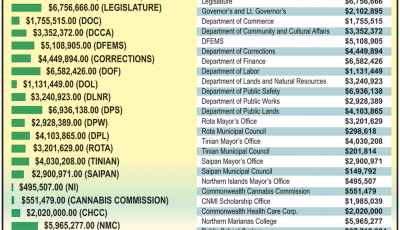Justices: Judge’s interpretation of elements of sex assault in error
The CNMI Supreme Court has ruled that Superior Court Associate Judge Joseph N. Camacho’s interpretation of the elements of sexual assault in the first degree was wrong.
The Supreme Court said Camacho clearly erred by dismissing the sexual assault in the first-degree charge based on the ages of the offender and victim.
The high court directed Camacho to reconsider his previous order that found no probable cause to file a charge of sexual assault in the first degree against George Norris Langu Jr.
The Supreme Court issued the decision Wednesday in granting on the government’s petition for a writ of mandamus. Chief Justice Alexandro C. Castro and associate justices John A. Manglona and Perry B. Inos issued the opinion.
The justices noted that the potential for other cases to be dismissed on the same grounds is significant. Because Camacho indicated that he had seen similar cases in the past, the justices said there is a risk that the same error will recur if the law is not immediately clarified.
The Office of the Attorney General filed the petition for a writ of mandamus, asking the high court to step in to correct the mistake Camacho made in dismissing the first-degree sexual assault charge filed against the 18-year-old Langu.
Assistant attorney general Matthew C. Baisley asked the high court to instruct Camacho to reinstate the sexual assault charge. He also asked the high court to instruct the trial court that there is no legislative loophole in the first-degree sexual assault statute.
Langu is facing five charges, including a count of sexual assault in the first degree, for allegedly raping his 16-year-old neighbor on Saipan.
After the preliminary hearing, citing a loophole in the sex crime laws, Camacho found no probable cause to believe that sexual assault in the first degree was committed. The judge pointed out that recent legislative amendments to the sex crime laws precluded prosecutions where the alleged offender is 18 years old and the victim is 16 years old.
In an amicus brief, Camacho expressed his concern about the gap in the sexual offense law but that he believes the proper approach would be to handle this issue legislatively.
Camacho said if both sexual assault and sexual abuse of a minor statutes apply in a particular case, the Commonwealth potentially runs the risk of multiplicitous charges and confusion of the jury.
In granting the government’s petition for mandamus, the justices said the plain language of the sexual assault in the first-degree statute indicates that the Legislature did not intend to legalize nonconsensual sex between a 16-year-old victim and an 18-year-old offender.
The justices said a person violates the statute if he or she engages in nonconsensual sexual penetration with another, regardless of the age of the victim or offender.
“Nothing in the statute indicates an offender cannot be charged for sexual assault in the first degree if the victim is a minor,” the justices pointed out.
As to other means of redress, the justices said re-filing the charge will likely prove futile because the finding of no probable cause was premised on an erroneous interpretation of law.
The justices said nothing in the record indicates that Camacho found the government’s evidence unconvincing.
Although there is a pending motion to reconsider, the justices said Camacho’s brief clearly shows that he will not reconsider and change his interpretation of the law.
“Consequently, there are no available avenues for relief, and the Commonwealth will suffer prejudice because it will be unable to effectively prosecute a subset of sexual assault in the first degree cases until this issue is resolved,” they said.

























